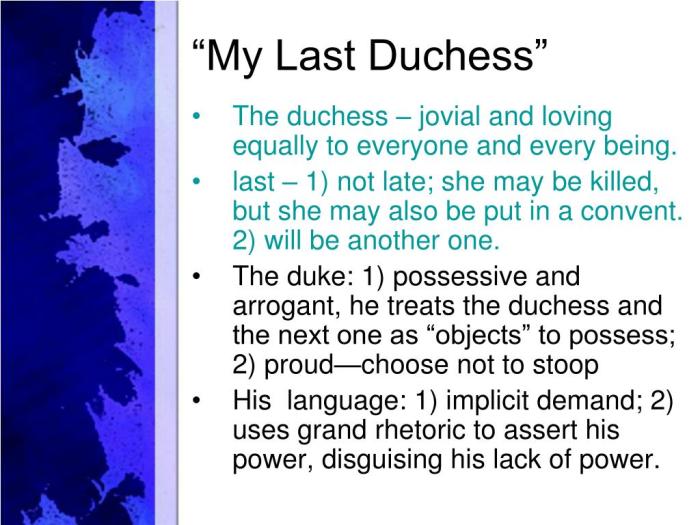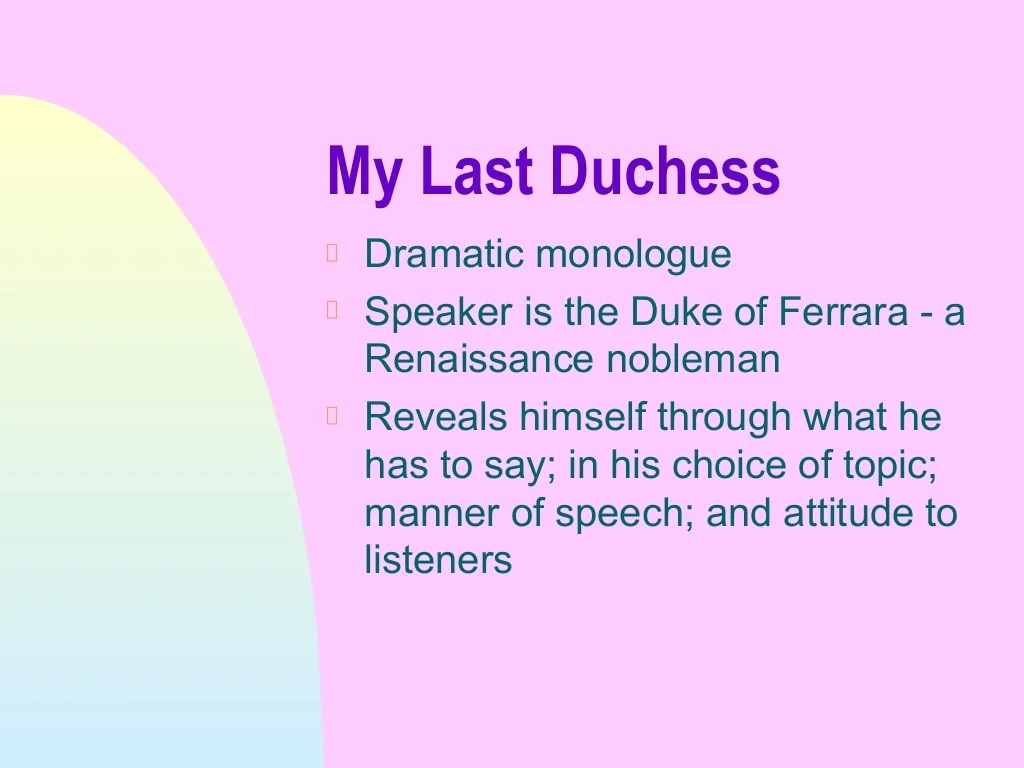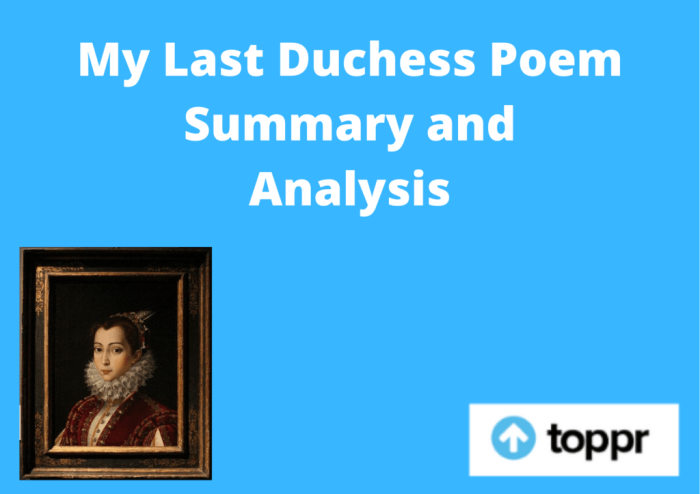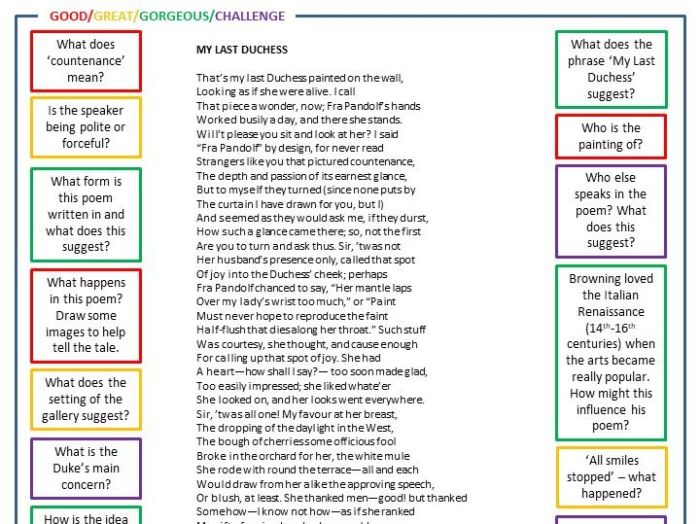Irony in my last duchess – Irony in “My Last Duchess” takes center stage in this captivating exploration, unveiling a narrative woven with intricate details and brimming with originality from the very first line.
This poem by Robert Browning presents a complex tapestry of dramatic, situational, and verbal irony, inviting readers to delve into the depths of its literary artistry.
Dramatic Irony in “My Last Duchess”

Dramatic irony occurs when the audience knows something that a character does not, creating a sense of suspense or tension. In “My Last Duchess,” the Duke’s perspective on his late wife differs significantly from the audience’s, leading to several instances of dramatic irony.
The Duke’s Perspective
The Duke presents his wife as a beautiful but flawed woman who failed to meet his expectations. He claims she was “too easily impressed” and “listened too much to the court.” He also implies that she was unfaithful, as he says she “looked too long” at other men.
The Audience’s Perspective
In contrast, the audience sees a more complex and sympathetic portrayal of the Duchess. Through the Duke’s descriptions, we can infer that she was a lively and curious woman who enjoyed life and had a genuine interest in the people around her.
Her “fault,” it seems, was simply that she did not conform to the Duke’s rigid and controlling expectations.
Examples of Dramatic Irony
- The Duke says his wife “had a heart – how shall I say? – too soon made glad,” implying that she was too easily pleased. However, the audience can see that she was simply a joyful and open-hearted person.
The irony in “My Last Duchess” is subtle and clever, like the riddle skinny i am fast riddle . The Duke’s description of his late wife’s supposed flaws reveals his own arrogance and inability to truly appreciate her. Similarly, the riddle’s answer – a candle – is both obvious and unexpected, highlighting the irony in the Duke’s perception of his wife and the limitations of his own perspective.
- The Duke claims that his wife “would speak / Too much of what she felt,” suggesting that she was indiscreet. However, the audience can see that she was simply an honest and expressive person.
- The Duke says that his wife “looked too long” at other men, implying that she was unfaithful. However, the audience can see that she was simply a curious and observant person.
Impact of Dramatic Irony
The dramatic irony in “My Last Duchess” enhances the reader’s understanding of the poem in several ways. First, it creates a sense of suspense and tension, as the audience knows that the Duke’s perspective is unreliable and that his wife was not as he portrays her.
Second, it allows the audience to sympathize with the Duchess and see her as a victim of the Duke’s controlling and manipulative nature. Finally, it highlights the theme of power and control in the poem, as the Duke uses his power to silence and control his wife.
Situational Irony in “My Last Duchess”

Situational irony occurs when the actual outcome of a situation is drastically different from what was expected or intended. In “My Last Duchess,” there are several instances of situational irony that create tension and surprise, adding depth to the poem’s overall meaning.
The Duke’s Motive
The most prominent instance of situational irony is the Duke’s motive for killing his wife. While he claims to have been motivated by her disobedience and lack of proper decorum, his actions suggest that he was driven by jealousy and possessiveness.
The irony lies in the fact that the Duke’s actions, which were intended to assert his authority and control, ultimately revealed his own insecurity and weakness.
The Duchess’s Portrait
Another instance of situational irony is the Duchess’s portrait. The Duke proudly displays her portrait as a symbol of his power and control, but it becomes a constant reminder of his own guilt and the loss of his wife. The irony is that the portrait, which was intended to glorify the Duchess, instead serves as a haunting symbol of her death and the Duke’s own tyranny.
The Duke’s Failure to Control, Irony in my last duchess
Throughout the poem, the Duke attempts to control every aspect of his life, including the narrative surrounding his wife’s death. However, his efforts to control the situation ultimately fail. The Duchess’s portrait continues to haunt him, and the truth about his actions becomes evident to the reader.
The irony lies in the Duke’s inability to control the narrative and the consequences of his own actions.
In conclusion, the situational irony in “My Last Duchess” creates tension, surprise, and adds depth to the poem’s overall meaning. The Duke’s motive for killing his wife, the Duchess’s portrait, and the Duke’s failure to control all contribute to the poem’s exploration of power, control, and the consequences of unchecked desire.
Verbal Irony in “My Last Duchess”

Verbal irony is a figure of speech where the speaker expresses the opposite of what they mean, often to create a humorous or sarcastic effect. In “My Last Duchess,” the speaker, Duke Ferrara, employs verbal irony throughout the poem to reveal his true feelings about his late wife.
Examples of Verbal Irony
- “She had a heart… how shall I say?- too soon made glad, / Too easily impressed…” : The Duke claims that his wife was too easily pleased, but his tone suggests that he found her excessive happiness annoying.
- “There she stands / As if alive…”: The Duke describes his wife’s portrait as if she were still living, yet he has had her killed.
- “I gave commands; / Then all smiles stopped together…”: The Duke nonchalantly mentions ordering his wife’s death as if it were a minor inconvenience.
Contribution to Tone and Mood
The use of verbal irony contributes to the poem’s dark and sinister tone. The Duke’s表面上 polite and charming demeanor masks a deep-seated resentment and cruelty. The irony highlights the gap between his words and his true feelings, creating a sense of tension and unease.
Revealing the Speaker’s True Feelings
The Duke’s verbal irony allows him to express his true feelings about his wife without directly stating them. By using irony, he can maintain a facade of civility while simultaneously revealing his disdain for her. This technique adds depth to the Duke’s character and makes him a more complex and enigmatic figure.
Irony and Characterization in “My Last Duchess”

Irony plays a crucial role in shaping the Duke’s character in Robert Browning’s “My Last Duchess.” Through the use of irony, Browning reveals the Duke’s complex and flawed nature, ultimately shaping the reader’s perception of him.
Irony and the Duke’s Character Flaws
The Duke’s use of irony highlights his arrogance and disdain for others. He ironically remarks that his last duchess was “too easily impressed,” suggesting that she lacked refinement and taste. This statement, however, reveals the Duke’s own shallowness and elitism.
Irony and the Duke’s Motivations
Irony also sheds light on the Duke’s motivations. He claims that he had his last duchess killed because she was “too free with her smiles.” This ironic justification suggests that the Duke was driven by jealousy and a desire for absolute control over his wife.
Irony and the Reader’s Perception
The use of irony in “My Last Duchess” shapes the reader’s perception of the Duke. Through irony, Browning creates a character who is both charming and sinister, evoking a sense of unease and suspicion in the reader. The Duke’s ironic remarks reveal his true nature, exposing his manipulative and cruel tendencies.
Irony and Theme in “My Last Duchess”

Irony permeates Robert Browning’s “My Last Duchess” and serves as a powerful tool in exploring its central themes. These themes include the destructive nature of pride, the objectification of women, and the perils of unchecked power.
Irony and Pride
The poem’s protagonist, the Duke, exhibits a profound sense of pride that ultimately leads to his downfall. Through the use of irony, Browning highlights the Duke’s hubris and his inability to recognize his own flaws. For example, the Duke boasts of his control over his possessions, including his late wife, yet he is oblivious to the fact that his pride has alienated her and driven her to an untimely death.
Detailed FAQs: Irony In My Last Duchess
What is the significance of dramatic irony in “My Last Duchess”?
Dramatic irony allows readers to see the discrepancy between the Duke’s perspective and the audience’s understanding, enhancing the poem’s suspense and impact.
How does situational irony contribute to the poem’s meaning?
Situational irony creates tension and surprise, highlighting the gap between expectations and reality, and underscoring the poem’s central themes.
What is the role of verbal irony in shaping the poem’s tone?
Verbal irony reveals the Duke’s true feelings and intentions, adding layers of complexity to his character and contributing to the poem’s dark and unsettling atmosphere.